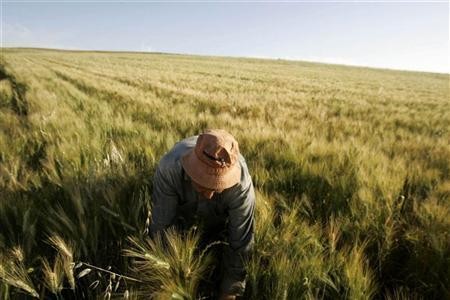
Farmers around the world could help reduce global climate change by using more-precise quantity of nitrogen-based fertilizers, according to a new study.
According to researchers at Michigan State University, nitrogen fertilizer contributes to emission of green house gas from agricultural fields.
The study involved data from across the world to prove that emission of nitrous oxide, which is a greenhouse gas produced in soil and further application of nitrogen as fertilizer, increases the emission of green house faster than expected.
"Agriculture accounts for eight to 14 percent of all greenhouse gas production globally. We are showing how farmers can help to reduce this number by applying nitrogen fertiliser more precisely," Phys.org quoted Phil Robertson, director of Michigan State University's Kellogg Biological Station Long-term Ecological Research Program.
Nitrogen-based fertilizers promote greenhouse gas emissions by stimulating soil microbes to produce ample amount of nitrous oxide.
After carbon dioxide and methane gas, Nitrous oxide is the most harmful greenhouse gas. It also destroys stratospheric ozone. Agriculture alone accounts for about 80 percent of nitrous oxide emissions globally due to humans and the amount have increased substantially in recent years, mostly because of increased use of nitrogen fertilizer.
"Our specific motivation is to learn where to best target agricultural efforts to slow global warming. Agriculture accounts for 8 to 14 percent of all greenhouse gas production globally. We're showing how farmers can help to reduce this number by applying nitrogen fertilizer more precisely, " Robertson added.
However, the production of nitrous oxide can be significantly reduced if the amount of fertilizer that is needed by crops is exactly what is applied to farmers' fields.
"Simply put, when plant nitrogen needs are matched with the nitrogen that is supplied, fertilizer has substantially less effect on greenhouse gas emission," Robertson noted.
The research also revealed that more nitrogen fertilizer could be added to under fertilized crops in sub-Saharan Africa.
"Because nitrous oxide emissions would not be accelerated by fertilisers until crop nitrogen needs are met, more nitrogen fertiliser can be added to underfertilised crops with little impact on emissions," Iurii Shcherbak, a researcher at Michigan State University, added.
Adding low amount of nitrogen to over fertilized crops would bring major reductions to greenhouse gas emissions in those regions.
The research was funded by the Electric Power Research Institute, National Science Foundation, the Department of Energy's Great Lakes Bioenergy Research Center.
The details of the study have been published in the journal Proceedings of the National Academy of Sciences.








